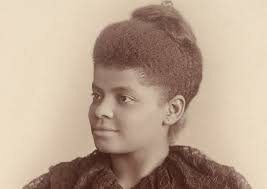(Akiit.com) The crusading journalist, Ida B. Wells was born on July 16, 1862. Although she made her mark as a journalist, she was also a social worker, advocate, feminist, and organization leader. She too often gets short shrift in history, mainly because she did not go along to get along with the men of her era, crossing swords with the likes of Dr. WEB DuBois and Booker T. Washington. The same fierceness that pushed her to organize against lynching was the fierceness that propelled her to confront injustice within African American organizations and in women’s organizations. Indeed, the historic 1913 Women’s Suffrage March intended to either exclude Black women or to segregate them at the end of the march. Ida B. Wells and Mary Church Terrell were among the Black women who marched with the women of their state, refusing to march at the rear.
Ida B. Wells’ pen was so sharp that it got her banned from the state of Tennessee after she besmirched white women’s morality in a treatise about lynching. No matter! She kept writing and kept it moving, constantly speaking truth to power. Now, Rev. Jesse Jackson is among those clamoring for an anti-lynching law, since none was ever passed, despite several efforts. Even though anti-lynching legislation passed the House of Representatives in 1922, Senate Democrats prevented the passage of the law by filibuster.
Jackson is among those clamoring for an anti-lynching law, since none was ever passed, despite several efforts. Even though anti-lynching legislation passed the House of Representatives in 1922, Senate Democrats prevented the passage of the law by filibuster.
In any case, Ida B. Wells spent her life championing the cause of racial justice. Unfortunately, there are too few today who have her passion, her focus, and her energy. In these troubled times, investigative journalists like her are far too rare. In an era when there is so much “drive-by” reporting done by anyone with a cell phone and access to the internet, too few are willing to put in the kind of work that Ida B. Wells put in, even though we have more tools than she had. Thus we get momentary Internet outrage when out-of-control whites attack Black people. Where is the follow-up?
Ida B. Wells had nerve, audacity. She was on fire for justice, and it showed in her writing. Her mantra is best summarized in her quote, “The way to right wrongs is to turn the light of truth upon them.” In her book, Southern Horrors, she detailed the horrors of lynching and the fact that so many lynchings were the result of rumor, not fact. Any Black man who looked sideways at the wrong white woman was subject to lynching, so much so that even in the rare case where Black men were acquitted of rape, rabid crowds lynched them.
At least 3,436 people were lynched between 1889 and 1922. In just the four years between 1918 and 1921, twenty-eight people were publicly burned to death. And while Black men were the primary victims of lynching, Black women, union organizers, and others were also lynched. Because of Ida B. Wells, we have more detail than we might have had about these horrors.
Few have the audacity of Ida B. Wells, but Bryan Stevenson surely does. His National Memorial for Peace and Justice in Montgomery, Alabama lifts up the name of the more than four thousand African Americans who were lynched in the South between 1877 and 1950. Stevenson, through his work to save African Americans from death row, makes the connection between historical lynching and modern-day criminal injustice. He is as eloquent as Ida B and as purposeful. Would that we had hundreds more of him, hundreds more of Wells.
It is shameful that there is no statue of Ida B. Wells anywhere in this nation. There should be one at Rust College in Holly Springs, Mississippi, where she once matriculated. There should be one in Chicago, where she lived from 1893 until her death in 1931. There should be one somewhere in Washington, DC, perhaps along the route of the 1913 Women’s Suffrage March. She should be lifted up to remind us of the power of audacity.
Her great-granddaughter, Michelle Duster, has been raising money to build a statue in Chicago, but she is still about $100,000 short of her goal. You can donate to the cause through http://www.idabwellsmonument.org/. We need to have more Black women, and especially women like Ida B. Wells, represented in our nation’s statuary.
We need to be reminded of Wells and her audacity, especially now, when so many seem to have been silenced by 45’s trickery. Our African American leaders need to stop with the complicity of go along to get along. We need an Ida B. Wells now! (Congresswoman Maxine Waters comes close). We need unfiltered audacity!
Columnist; Julianne Malveaux
FB Page; http://facebook.com/julianne.malveaux








Leave a Reply